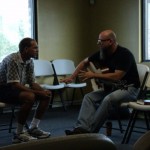Do we want community? Really?
Arthur at “The Voice of One Crying Out in Suburbia” raises some great questions about community in Christ in his post “Book Review: Why We Live In Community.”
The post begins as a review of an e-book by Eberhard Arnold called Why We Live In Community. But, reading the book and thinking about the topic leads Arthur to ask some very important questions.
For example, consider this part of his post:
Most importantly, why don’t we live in community? Could it be that we love our autonomy, our freedom, our wealth and possessions more than each other? Is the idea of that sort of closeness and openness in this life scary to people who affirm in theory that sort of relationship in eternity? Perhaps most troubling, could it be that we fear living community in whatever shape it takes because we don’t really believe what we read in the Bible, just as we don’t seem to believe so much of what Jesus taught or how He lived or what He commanded? Is it just easier to live lives of religious observance and to find ways to nitpick and divide from one another so that we can justify our disunity? These are troubling questions but they are hammering me.
I agree with Arthur: these are troubling questions. I’ve wrestled with many of these questions, and continue to do so from time to time.
Why do you do when you find that you really don’t want to live in community in Christ with others?
Mutual Participation: Dip your toes into the waters or dive into the deep end?
For the last two days, I’ve been trying to decide what to do with Art’s latest comment on my post “Replay: How do we edify others?”
First, I think the comment is a well-articulated comment and a necessary component of our discussion of edifying one another when we gather with the church.
Second, Art’s comment is another indicator that he should be writing this stuff for his own blog… but then I need to keep my mouth shut so that he continues to leave the comments here.
I thought about copying Art’s entire comment, but I decided to continue the discussion by asking a question… which I’ll get to by the end of this post.
In the comment, Art is talking about participatory meetings. Now, for most Christians, church gatherings are not a time of real participation. They primarily gather to hear from others, and usually they hear from the same person week in and week out.
Some churches move toward more participatory meetings by having different people speak from week to week, or by encouraging comments or questions after the speaker is finished.
Other groups of believers move along the spectrum toward mutual participation by having a discussion about a specific topic or passage of Scripture.
Finally, some groups come together without a preplanned topic or passage.
Now, if a group of believers recognizes that mutual participation is beneficial for the church, and if that same group of believers recognizes that they do not all participate when they gather together, what should they do? Should they take steps toward mutual participation (perhaps along the spectrum that I described above), or should they jump in with both feet directly into all participating without a preplanned topic or passage?
This is the question that Art poses in his comment:
Doesn’t our best attempts to move past the pastor controlled meeting space still deny committing one another to the care and capability of the Spirit in contributing to one another when assembled? Wasn’t this something Paul was very quick to do with pagans only recently converted, leaving them on their own after a few weeks or months without “leadership?” Do the saints, in fact, need us and not the Spirit, to help them begin to “participate” so narrowly? I suppose I’m advocating “throwing the meeting in the deep end of the pool to learn to swim together,” but this seems to be the biblical pattern.
As you can see, I borrowed Art’s swimming analogy for this post.
So, what do you say? If a group desires mutual participation for the sake of helping one another grow in Christ, is it better to take small, incremental steps by adding more and more participation? Or is it better to scrap all facilitators and plans in order to provide opportunities for mutual participation immediately? Why?
When every part of the body of Christ functions together
Josh at “Called to Rebuild” has written another excellent post. This one is called “Missing the church.”
He begins by explaining that many close friends have been transitioning out of his life lately. Josh feels the loss… and that along is an amazing thought. In a time when “church” has become just another activity, it is a real family for Josh.
Next, he describes a time when God began to show him what could happen when the whole body of Christ worked together. He writes:
Anyway, as I sat there listening something just came over me. Tears welled up in my eyes. Nothing being said was at all specific to my trial at the time, but that didn’t matter. In a way I can’t adequately explain with words, I saw Christ being revealed as I listened to the brothers and sisters sharing. It was powerful. All the pressure from the burden in my heart was like a great big logjam, but as I beheld Christ through the functioning of His Body it was like a mighty river came bursting through the channels of my heart, forcing it all to the surface and clearing it away.
Josh refers to 1 Corinthians 14:24-25. While Paul writes about an unbeliever recognizing the presence of God among the church because everyone is prophesying, I can see how it would apply to Josh’s situation too.
As I read Josh’s post, I love this statement: “[A]s I beheld Christ through the functioning of His Body it was like a mighty river came bursting through the channels of my heart, forcing it all to the surface and clearing it away.”
Reading that, it’s easy to understand why Josh would say that he misses his brothers and sisters in Christ.
Some Simple Thoughts about our Church Gatherings
My friend Chris blogs over at “Simple Thoughts“… and thus the title of this post. I want to point you to a post he recently wrote called “Normal.”
Chris shares some of the things his family has been going through recently – specifically related to wife’s ongoing health issues. However, he also gives a brief description of our church gatherings.
You see, a few weeks ago, Chris and his family starting gathering with us on Sunday mornings.
This is the way that he describes those times of meeting together:
Now they conduct church different than the norm. There is no loud bands or video presentations, or people talking and carrying on hundreds of different conversations. This is a small community, of faithful God fearing people wanting to learn more about the Scriptures than what is preached at the pulpit, or discussed in the 1 hour (really 30 or 45 min) Sunday school class. They set out folding chairs in a small room. There is no pulpit. They have hymnals spaced about on about every other chair. They use their hymnal and select songs that have been on their heart. There is not one person selecting songs, it is a community choosing songs. Either before or after each song selected, the person that chose the song, expresses why they chose that song. Usually it is due to being their favorite, or it is because sometime during the week or lately, that song has touched their heart during a situation in their life. They pray, and then they discuss scripture. Yes, there is someone who is leading the discussion. But he is not there to state how it applies to him but all understand there is one meaning and many applications. So we get to hear the different applications that pertain to that different part of scripture. There is no time limit on the discussion. Then they pray over prayer requests that are shared and eat together afterwards. Keep in mind, there is no nursery, or children’s church. These are families, gathering as families, to share life and scripture.
I was really concerned more about what my teen children were thinking about the whole gathering. Come to find out they enjoyed it. They stated that they do not walk away confused but understand the scripture better, because they here different perspectives to the application of scripture. This allows them to hear from different people, mainly adults, on how they have applied scripture to their lives in order to glorify God.
I appreciate Chris writing about us. I had a chance to talk with him about the last part of his description – mainly, the benefit of several people speaking, teaching, encouraging, etc. when we gather together. Hopefully, I’ll have time to write more about that soon.
Like I’ve said before, I describe us a “hybrid” – somewhere between the more traditional, institutional side of the church and the more organic, simple side. Of course, that just means that our gatherings tend to frustrate people from both sides. That also means that our gatherings give us constant opportunities to not only edify one another, but also to give up our own preferences for the sake of our brothers and sisters – whether those preferences lean toward the organic side or the institutional side.
Scripture… As We Live It #192
This is the 192nd passage in “Scripture… As We Live It.”
There came a woman of Samaria to draw water. Jesus said to her, “Give me a drink I need to leave, because it’s not wise for me to spend time alone with a woman who is not my wife.” (John 4:7 re-mix)
(Please read the first post for an explanation of this series.)
Will you read about my friends Lew and Kati and consider helping them?
My friend Lew and Kati recently made the HUGE decision to adopt a little girl from the Democratic Republic of Congo.
Earlier this week, they found out that her older brother is also up for adoption. So, guess what they’ve decided to do?!? They’ve decided to adopt the brother also!
While they are understandably excited, they also realize that they have a huge hurdle in front of them. Besides the cost of the original adoption, they now had an added $7500 to adopt two.
Would you read through their adoption site “No Stretch Marks Required” and perhaps consider helping them out by purchasing an item or two or more from their fundraisers list?
I appreciate it… and I know they appreciate it also.
Replay: How do we edify others?
Two year ago, in January 2010, I started a series on the subject of mutual edification by looking at a passage in 1 Thessalonians. The series continued with posts about passages in Romans and 1 Corinthians. Finally, it ended with posts that asked a couple of questions: 1) who edifies whom? and 2) how do we edify others?
The post below was the conclusion of that series: “How do we edify others?” I do not offer specific steps towards edification, because I think the “steps” will changed based on the people involved. However, I do offer a few guidelines that I’ve noticed about edification. If you’re interested, links to the other posts in the series can be found at the bottom of the post.
—————————————
This is my last planned post on edification for this week (see “Salvation as the motivation for mutual edification,” “Acceptance and edification,” “What is Edification?” and “Who edifies whom?“). In this post, I would like us to consider some of the methods we can use to edify others.
Once again, let’s with begin the definition from a previous post: Edification is using words and deeds in the context of familial relationships and fellowship to help one or more followers of Jesus Christ grow in their understanding of Christ, their love for and unity with their brothers and sisters in Christ, and their faithfulness in living like Christ.
There are a few things to consider at the beginning. We are gifted differently. We have different opportunities. We spend time with different people who need to mature in different ways. We are all at different levels of spiritual maturity in different parts of our lives. We cannot make specific statements about methods of edification that will cover all instances.
However, there are some general guidelines that can help us think through how we are (or are not) edifying others. For instance, I think we can all agree that Scripture teaches that we can use our words to either edify (build up) or destroy (tear down). But, it’s not just our words. Our actions (deeds or lack of deeds done for the purpose of serving others) can work to either edify or destroy. If we desire for people to grow both in their understanding and in their way of life, then both our words and our way of life must be used to edify.
Second, we must understand that in different contexts, different methods of edification are appropriate. Paul makes this very clear in 1 Corinthians 14. For example, while uninterpreted tongues is an appropriate means of edifying the one speaking, it is an inappropriate means of edifying a group of believers.
Third, in spite of the second principle, we should still recognize that ANY time we spend with another person or other people is an opportunity for edification. We see this in Scripture often as people make disciples and encourage one another when the church is meeting together, or when they are working together, or when they are sharing meals together, or when they are traveling together.
Fourth, edification is a mutual process. If I only view myself as the “edifier” in a certain relationships, then I have misunderstood the way that God’s Spirit works through his children. Even if I am the more mature believer, I can still learn from and be encouraged by and be discipled by (i.e., edified by) a less mature brother or sister. I can be wrong… I am wrong in many of my beliefs, my relationships with others, and my way of life. Humility is very important in our relationships with other believers such that we are willing accept the teaching, correction, example, etc. of others.
Fifth, and finally for now, in order for the church to grow in maturity, every believers must take advantage of the opportunities, giftings, talents, abilities, relationships, etc. that God has given them. Excellent leadership does not produce growth in the church. A phenomenal teacher/preacher does not produce growth in the church. Instead, it is when all believers are working together to edify one another that Paul says the church (together) will grow in maturity toward Jesus Christ.
I know that I still have much to learn about edification. I’m looking forward to the times that God uses the people in my life to edify me, just as I’m looking forward to times when God chooses to use me to edify others. We need one another.
————————————–
Some Thoughts on Mutual Edification:
Exhausting ourselves for the sake of others
My friend Lionel at “a view of the woods” doesn’t blog that much anymore. Something about life and work and school and family and other lame excuses. Anyway, when he does blog, it is well worth reading. For example, consider his latest post “Exhausted For Love’s Sake.”
Lionel admits that he’s been very tired lately… but what has been making him tired? Being tired is not a problem… what makes us tired or exhausted could indicate a problem.
I love the way he describes this:
Paul writes in 2 Corinthians about his current state of life (and no I am not saying we have to live like Paul or should aspire, but we can learn from him). He was hungry, tired, naked, threatened, beat all for the Gospel. He had no notoriety, was not climbing the corporate ladder, was not chasing more education or a higher paycheck, actually he says in another letter “I count it all a loss”. Paul once he met Christ decided to forfeit those things I have decided to exhaust myself for them. While he decided to be exhausted for people, I have been exhausted for stuff. Stuff will burn, loving people builds eternal value. I am exhausted for the worthless, Paul, exhausted for the priceless.
Thanks for a great post and great challenge, Lionel!
What do you think? What are you being exhausted by?
The Church: Not an ideal but a divine reality
Recently, a friend of mine returned my copy of Dietrich Bonhoeffer’s Life Together: The Classic Exploration of Faith in Community. I’ve read the book a couple of times, and my friend had asked me if he could borrow it. To be honest, I had completely forgotten that I had given it to him.
But, when my friend returned the book, I decided to read through it again. Early in the first chapter, I ran across a paragraph that I know that I had read several times. But, this time, it caused me to stop and think and think some more. As a matter of fact, I’ve been thinking about this paragraph for the last week or so.
This is the paragraph that I’m talking about, the first paragraph in a section titled “Not an Ideal but a Divine Reality”:
Innumerable times a whole Christian community has broken down because it had sprung from a wish dream. The serious Christian, set down for the first time in a Christian community, is likely to bring with him a very definite idea of what Christian life together should be and to try to realize it. But God’s grace speedily shatters such dreams. Just as surely as God desires to lead us to a knowledge of genuine Christian fellowship, so surely must we be overwhelmed by a great disillusionment with others, with Christians in general, and, if we are fortunate, with ourselves.
Our dreams and designs are NOT community in Christ. This point that Bonhoeffer is making is so important for our life in Christ and for our life with one another.
The reality in Christ is that we are broken people, and any designs or dreams that we place on community in Jesus Christ will be broken as well – even and especially when it looks perfect to us. What we design will always reflect us, not God.
However, God places broken people together – people who should never be able to share life together. This reality, as Bonhoeffer says, God shatters by his grace. Doesn’t that sound strange? God shatters our idealistic dreams of community by placing us among real people… this is his grace.
So, what is this “knowledge of genuine Christian fellowship” that Bonhoeffer talks about in the middle of this passage about real, divine community (not ideal community)? It is just that – sharing life in the midst of real, divine, broken, overwhelmed, hurting, disillusioned, wrong, selfish, unloving, stressed, messy community. When we can fellowship with one another IN SPITE of our brokenness and THROUGH Jesus Christ only (not our designs or dreams), then we are living in community in Jesus Christ.
Community in Christ is realized among those with whom we should not have community. It’s similar to what Jesus said in the Sermon on the Mount. Even those who are not God’s children know how to love people who love them back. But, God’s children love those who hate them, who persecute them, who curse them. God’s children fellowship with those who are different than them, who disagree with them, who are disillusioned with them.
Why? Because God’s children seek community and fellowship ONLY in Jesus Christ… and everything else is allowed to fall away.
How much organization and administration is necessary to finance global missions?
There are different ways to answer the question in the title of this post: How much organization and administration is necessary to finance global missions? Different denominations and church organizations have answered this question in different ways, but most of the answers focus on some type of organization with administrative requirements, as evidenced by the proliferation of missions boards and sending organizations.
However, Felicity at “Simply Church” offers a different perspective in her post “How are simple/organic churches financing mission?”
When I first read the title of her post, I was expecting a “how to” post with examples explaining what different groups are doing. But, that is NOT what her post is about.
Instead, Felicity cites results from a doctoral dissertation which compared the giving patterns and missions financing patterns of different churches. Here are some of the findings:
Of those surveyed, 51.6% of those involved in organic/simple church gave 11%-25% of their income to charity, and 7.5% gave greater than 25%. In other words, almost 60% of people are giving more than a tithe. (The typical American Christian gives less than 3%.)
The money spent on the internal administration of simple/organic churches is very low: 59.1% of the participant’s house/simple church spent less than 1% of their total annual proceeds on internal needs, and 15.1% spent 2%-5%. In other words, more than 70% say their simple church spends less than 5% on administration costs. (The typical institutional church spends 85% of all church activity and funds directly toward the internal operations of the congregation, such as staff salaries, building payments, utility and operating expenses.)
People in simple/organic churches are giving more, but their churches are spending less on internal needs, so more money is made available for Kingdom purposes. Their money goes towards benevolence and missions.
Moving away from the “traditional,” “institutional,” “simple,” and “organic” labels for a moment, these results raise some good questions.
For example, are we actually helping missions activity by requiring those activities and individuals to be funded through a missions organization? Is it actually possible for us to spend less on ourselves (funding our programs, our meeting locations, our leaders, etc.) in order to give more money to help those in need and to help those traveling from place to place to proclaim the good news of Jesus Christ?
What other questions do these results raise?










